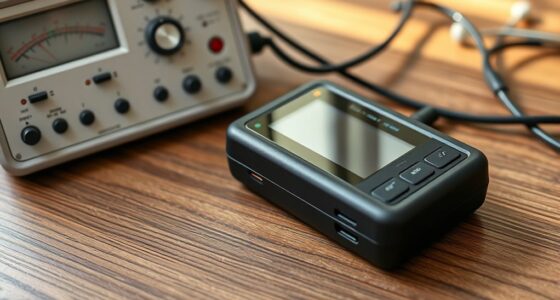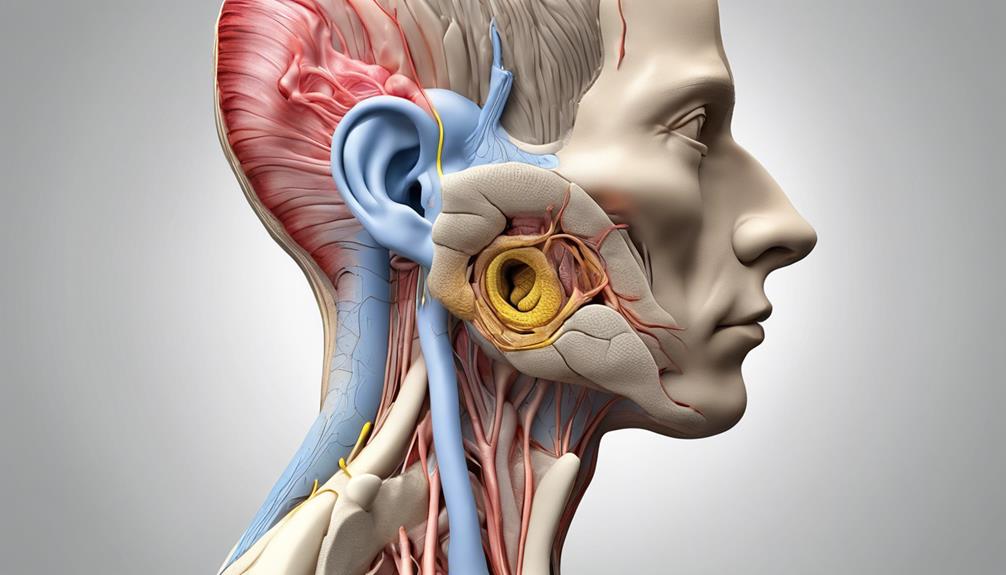Navigating the complex landscape of diagnosing and coding for ICD hearing impairment presents a major challenge. With evolving standards and the critical need for accurate coding in providing patient care, it is essential for professionals to stay current.
Understanding the nuances of categorizing hearing loss can significantly impact treatment decisions and healthcare outcomes.
Let's explore the depths of this comprehensive guide to unravel the complexities and master the art of precise documentation for improved healthcare practices.
Key Takeaways
- Understanding types and causes aids precise ICD-10 coding.
- Early symptom recognition crucial for timely diagnosis and treatment.
- Accurate diagnosis guides personalized treatment plans.
- Coding accuracy supports effective communication and improved patient outcomes.
Types of Hearing Loss and Causes
Exploring the various types and causes of hearing loss provides essential insights for accurate diagnosis and coding in the field of audiology.
Conductive hearing loss, often attributed to issues like earwax accumulation, middle ear fluid, or problems with the ear canal or eardrum, impedes the sound conduction to the inner ear.
On the other hand, sensorineural hearing loss, associated with inner ear or auditory nerve damage, stems from factors such as aging, noise exposure, genetics, or specific medications. This type affects the auditory nerve's ability to transmit signals to the brain.
Mixed hearing loss combines elements of both conductive and sensorineural impairment, impacting both the outer/middle ear and the inner ear.
When the specific type or cause of hearing loss is unclear, unspecified hearing loss codes are utilized, emphasizing the need for precise documentation in medical records to facilitate appropriate ICD-10 coding for optimal diagnosis and treatment planning.
Symptoms and Presentations

Upon experiencing hearing loss, individuals may manifest symptoms such as difficulty understanding speech, ringing in the ears (tinnitus), and social withdrawal.
Challenges in phone conversations, sensitivity to high-pitched sounds, and academic difficulties can indicate hearing loss.
Hearing loss symptoms can impact daily activities, social interactions, and academic performance significantly.
Different types and severities of hearing loss present with varying symptoms that affect an individual's quality of life.
Recognizing these signs is crucial in diagnosing hearing loss promptly. The severity and type of hearing loss can influence the specific symptoms a person may exhibit. Understanding these presentations aids healthcare providers in determining the most appropriate course of action for managing and treating the condition effectively. By being attentive to these symptoms and their variations, individuals can seek timely intervention, thus improving their overall quality of life.
ICD-10 Code Categories

When diagnosing hearing loss, healthcare professionals rely on specific ICD-10 code categories to accurately categorize the condition for effective treatment planning and management. The ICD-10 code categories for hearing loss include Conductive and Sensorineural Hearing Loss (H90-H91), Other and Unspecified Hearing Loss (H92-H94), Other Hearing Loss (H95-H98), and Hearing Loss from External Causes (HAC-HAF).
These categories contain codes that describe various conditions related to hearing loss, aiding in precise diagnosis and tailored treatment strategies. Healthcare providers must differentiate between types of hearing loss, specify laterality, and update codes as needed to ensure appropriate care for patients.
Accurate ICD-10 coding within these specific categories is crucial for research, billing accuracy, and effective communication among healthcare professionals. Understanding and utilizing these code categories are essential for optimizing patient care outcomes in the management of hearing loss.
Diagnosis and Treatment Considerations

An accurate diagnosis of hearing loss involves a thorough evaluation by an audiologist to assess the degree, type, and cause of the impairment. This evaluation is crucial in developing an effective treatment plan tailored to the individual's needs.
When considering diagnosis and treatment for hearing loss, several key points should be taken into account:
- Early Intervention: Early detection of hearing loss is essential for better management outcomes. Timely intervention can prevent further deterioration and improve the quality of life for individuals with hearing impairment.
- Treatment Options: Various treatment options exist for hearing loss, including hearing aids, cochlear implants, assistive devices, rehabilitation programs, and speech therapy. The choice of treatment depends on the severity and type of hearing loss.
- Individualized Care: Individualized treatment programs are crafted based on accurate diagnosis and ICD-10 coding. This personalized approach ensures that the specific needs of each patient with hearing loss are addressed effectively.
Coding Tips for Healthcare Professionals

Healthcare professionals must prioritize familiarity with ICD-10 hearing loss categories to ensure accurate coding and billing practices in clinical environments. Selecting the correct ICD-10 codes for hearing loss requires gathering comprehensive patient information and understanding the specific characteristics of each case. Consulting with specialists or audiologists can offer valuable insights into determining the most appropriate codes for different types of hearing loss.
Accurate ICD-10 coding not only facilitates billing procedures but also contributes to improved research, statistical analysis, and treatment planning in healthcare management. By ensuring precise coding, healthcare professionals can deliver tailored treatment plans, enhance patient care, and ultimately achieve better outcomes in the management of hearing loss. Emphasizing the importance of accurate coding practices benefits both the healthcare providers and the patients they serve, driving optimal care delivery and overall patient satisfaction.
Frequently Asked Questions
What Is the ICD-10 Code for Comprehensive Hearing Test?
The ICD-10 code for a comprehensive hearing test is Z01.10. It's under the category of Encounter for examination of ears and hearing without abnormal findings.
This code is used when a patient has a routine or preventive hearing evaluation with no identified issues. Z01.10 indicates the visit was specifically for ear and hearing function examination.
Healthcare providers employ this code for accurate documentation and billing of comprehensive hearing tests in routine healthcare maintenance, ensuring proper reimbursement and patient care tracking.
What Is the ICD-10 Code for Impaired Hearing Loss?
When facing impaired hearing loss, selecting the correct ICD-10 code is crucial for accurate diagnosis and treatment. Differentiating between conductive, sensorineural, mixed, and unspecified types is essential for tailored care.
The right code ensures proper documentation and billing, supporting efficient healthcare management. Familiarity with the ICD-10 system empowers healthcare professionals to effectively address cases of impaired hearing, enabling comprehensive patient care.
What Are the 4 Types of Hearing Loss?
We've four types of hearing loss: conductive, sensorineural, mixed, and central.
Conductive hearing loss affects the outer or middle ear and is often treatable.
Sensorineural hearing loss results from inner ear or nerve damage and is usually permanent.
Mixed hearing loss combines characteristics of conductive and sensorineural loss.
Central hearing loss stems from issues in the brain's auditory pathways and can affect sound signal processing.
How Do You Know if Hearing Loss Is Sensorineural or Conductive?
When determining if hearing loss is sensorineural or conductive, audiometric testing plays a key role.
This testing helps identify the specific type of hearing loss by assessing how the inner ear and auditory nerve respond to sound stimuli.
Conclusion
In conclusion, accurate diagnosis and coding of hearing loss are crucial for effective patient care. Like a well-tuned instrument, standardized coding ensures seamless communication among healthcare professionals and optimal treatment decisions.
By understanding the types, causes, and symptoms of hearing loss, healthcare providers can provide timely interventions and improve outcomes for patients. Remember, proper documentation is key to unlocking the best outcomes in managing hearing loss cases.











